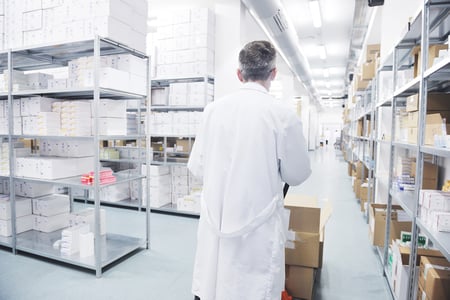
Checking in on your pharmacy suppliers - 7 questions to help gauge performance
 Operating a successful compounding pharmacy is a painfully relentless endeavor. To operate efficiently, safely and profitably requires diligence (cleaning and documenting), conformance (maintaining compliance and standards) and adaptability (responding to excursions). To operate successfully and efficiently pharmacy vendors must also maintain these standards.
Operating a successful compounding pharmacy is a painfully relentless endeavor. To operate efficiently, safely and profitably requires diligence (cleaning and documenting), conformance (maintaining compliance and standards) and adaptability (responding to excursions). To operate successfully and efficiently pharmacy vendors must also maintain these standards.
Can you speak to a supplier representative directly at this very moment? Do your suppliers maintain the necessary inventory and stocking levels to complement your pharmacy’s inventory management? Checking in with suppliers regularly helps gauge your pharmacy’s performance and build better relationships. Below are seven questions every pharmacy should ask their suppliers about delivery and pricing, and to ensure solid communications.
Delivery and Pricing
- Is your pharmacy ordering with enough lead time?
Ensure enough time has been allocated for delivery of your orders. Due dates should always be included on purchase orders. Establishing agreed-on product due dates will help your pharmacy stay on track with production runs, ensuring the products for each run will be available when needed. Shipping times vary by region so know your vendor’s lead times to deliver products to your facility. Establish standing orders for products that may have longer lead times. - Are your suppliers delivering items in proper packaging?
Supplier-shipped packages to pharmacies should always arrive in the original packaging from the manufacturer with bar codes and compliance documentation. Has your pharmacy received damaged or repackaged boxes with a random label? Pharmacy receivers should be watchful and identify any changes in product packaging. Notify suppliers immediately if products arrive damaged or in incorrect packaging. - Is your supplier’s pricing fair?
Make sure you are getting the best rates from suppliers to help your pharmacy maintain a good cost basis. Compare pricing and quality of products you have used previously with other suppliers. Seek out suppliers offering the highest quality goods with aggressive pricing - not always the lowest pricing – and compare delivery terms. As an example, a pharmacy might be able to save $10 per case of 70% isopropyl alcohol from a new supplier, but delivery terms may be much lengthier and not acceptable.
Supplier Communications
- Can you reach your supplier easily?
Contacting your pharmacy supplier to reach their sales, billing or customer service departments should be quick and efficient. Suppliers should always deliver reliable customer service, including during an emergency or unexpected weather event. At a minimum, inquiries to suppliers should be returned within 24 hours or on the next business day. - Does your supplier offer online ordering via a customer portal?
Ordering online through a customer portal is considered the most efficient ordering method because it is fully automated and is ideally an error free. Buyers select products and agree on pricing in a single, non-contact, order transaction. Customer portals can be customized for pharmacy customers, allowing buyers to review previous orders, pay invoices, track orders, and obtain product lot numbers and documentation for items ordered. Customer portals may also include feedback and customer service functionality. - Is your supplier willing to help with ordering and reordering?
Your pharmacy suppliers should be willing to help order sufficiently, without overbuying, and make product recommendations. Reducing bulk buying improves pharmacy cash flow. Suppliers should recommend standing orders for regularly purchased items according to your purchase history, which improves pharmacy efficiency. Choose suppliers who provide guidance on industry trends and make alternative product recommendations. As an example, having alternative suppliers identified can help avoid supply chain disruptions during natural disasters and other unforeseen events. - Does your supplier offer product education and training?
Your suppliers should prioritize educating customers to help them train and become more competent. Choose suppliers that offer webinars and other training for new products, industry trends, regulatory guidance, ordering and website walkthroughs. If necessary, suppliers should arrange calls with manufacturers and their technical teams for their customers when additional information is needed directly from the manufacturer.
Responses to these questions should come easily from your suppliers and hopefully create additional opportunities for more impactful conversations and discussions on how your pharmacy’s suppliers are positively (or negatively) impacting overall performance.
Since 2013, DiNovo Pharmacy & Packaging Provisions has been a leader in delivering cleanroom consumables, disinfectants, medical devices, and cold chain shipping solutions to the compounding and specialty pharmacy marketplace. As an educational resource, coupled with top global manufacturer partnerships, DiNovo helps pharmacies drive efficiency, manage costs, and enhance compliance to help guide you through a constantly changing pharmacy marketplace.
.png?width=500&height=153&name=DiNovo%20Full%20Logo%20-%20Both%20Tags%20(500x153).png)